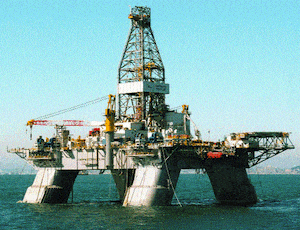A lawsuit has been filed against the Obama administration over the economic claims that the Bureau of Ocean Energy Management (BOEM) made in their 5-year plan to open up new areas around the United States to offshore oil and gas leasing. The suit, filed by the Center for Sustainable Economy (CSE), says that the administration not only grossly exaggerated the economic benefits of increased energy exploration, but also that they failed to take all costs into account.
BOEM’s plan would lease a total of 15 new areas for exploration, including areas within the Gulf of Mexico, the Cook Inlet, Alaskan waters, and the Beaufort Sea. But rather than focusing strictly on the environmental impact of the projects, CSE took an approach that tends to have better results in Washington – Economics.
The economic argument is very powerful, as CSE explains that the increased oil and gas exploration will cost the United States more than it will gain. And according to federal laws (specifically Section 18 of the Outer Continental Shelf Lands Act), in order to grant permission for projects such as the leasing program, there must be a net public gain.
For example, the best estimates for the amount of money to be made from oil and gas in these areas ranges from $1 to $2 billion per year. However, these areas currently provide an economic boost of as much as $70 billion a year from fishing, tourism, and other activities, all of which could be decimated in the event of an oil spill.
CSE released the following to explain the basis for their suit:
First, BOEM relied on a deeply flawed economic analysis to approve the program. The analysis fails to meet either professional standards or those set by law. For example, despite legal requirements to only consider benefits to American consumers, BOEM considered oil and gas industry profits, including foreign firms, and benefits to foreign consumers from export of refined products made from OCS oil. BOEM’s analysis also leaves out significant costs, such as government subsidies, and fails to account for essential economic information such as the glut of natural gas production and backlog of unused leases.
Second, BOEM’s Programmatic Environmental Impact Statement (PEIS) is extremely biased in favor of new drilling relative to the “no action” alternative that would leave oil and gas reserves in the ground. As an example, BOEM failed to consider the vast economic benefits of intact marine ecosystems in their natural state. As another, BOEM actually claims that the no action alternative would result in more pollution to U.S. waters than drilling under the theory that if drilling were not allowed, we would have to import more oil by way of tankers which spill more oil than drilling rigs.
Third, BOEM failed to incorporate the option value of waiting to develop additional OCS oil and gas reserves to benefit future generations. The importance of option value to analyze decisions under uncertainty has been widely recognized in the economics community for several decades. By not using standard economic methodologies that would incorporate the full option value of a resource, BOEM’s current leasing program overlooks a key factor in the decision, does not quantify all economic and environmental costs and benefits as accurately as possible, and ultimately leads BOEM to not make optimal choices on the timing of leases.
Furthermore, CSE points out that the best possible outcome from oil and gas exploration would be 14.3 billion barrels – enough to meet all U.S. needs (using solely those barrels) for a paltry 10 months. The lowest estimates show only 5.75 billion barrels, which is the U.S. demand for a little less than 4 months.
CSE has the correct strategy here. By framing the debate as an economic one, rather than an environmental one, they could likely gain broad support. Unfortunately, people tend to hear environmental issues and tune out because it doesn’t immediately affect them or they feel helpless.
By framing the debate in terms that could impact every American’s economic future, they have made this an issue that is easily understandable and has a broader appeal.
Subscribe to our newsletter
Stay up to date with DeSmog news and alerts







